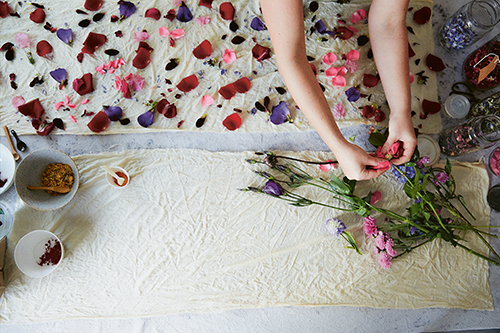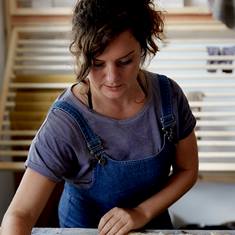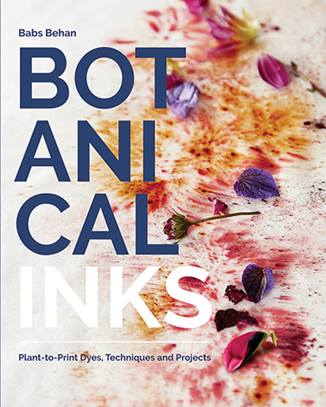Meet the Maker
Meet the Maker - Botanical Inks author Babs Behan
2 Jun 2018 |
Artist and designer Babs Behan is the founder of Bristol based natural dye studio Botanical Inks. Babs' first book, also called Botanical Inks, shows you how to extract environmentally sustainable colour from the landscape and use it to create natural dyes for textiles, clothing, paper and other materials. We caught up with Babs to talk about how she first got into natural dyeing.
How did you discover botanical dyeing?
I first discovered botanical dyeing through a friend who was travelling in North India. She had been to visit a family-run vegetable dye block print factory in Jaipur. They specialised in the fine Murghal style of block printing. Master craftsman and owner, Rashid, had actually trained the founder of Monsoon with his craft. I felt compelled to ask him to teach me too, so I did, and was invited to Jaipur to study with him. This was the beginning of a life-long adventure with natural dyes.
I have spent the last 15 years travelling the globe learning about different natural dye traditions in indigenous communities and take inspiration from Laos, Peru, Indonesia, Bolivia, Mexico and more contemporary emerging techniques in New York.
What was the first dye you made? And do you have a favourite colour to work with?
The first dye I ever made was probably a rich red from madder root in Asia.
My favourite colour is turquoise, so I love to over-dye indigo (blue) with weld (yellow) to create this vivid colour.
I also really love to recycle food waste as it's so abundantly available. I often use onion skins to get a rich burnt orange/bronze colour and avocado rinds to create a beautiful soft dusty pink.
What’s at the top of your bucket list?
Meeting and falling in love with my soul mate and co-creating an eco-centric, land-based fibre shed community together :)
How do you relax?
I try to do yoga and meditate every the morning to start the day at a base level of calm. I also find peace when walking and aim to go for at least one walk a week in the countryside where I can be with the trees and away from the bustle of the city. Apart from that I love taking time out to hang with my girlfriends and have a giggle. Additionally I like going to the lido for a refreshing dip a couple times a week.
If you weren’t crafting you would be…?
Probably an organic raw food chef!

What are your studio essentials?
You don’t need loads of equipment when dyeing but the equipment you do have is invaluable. My most essential item has to be my giant indigo vats for dyeing larger bolts of cloth and items of clothing. I couldn’t live without my wall mounted drying racks, which are so handy when I’ve got a lot of dyeing on the go. I also have an extensive collection of stainless steel pots and buckets and a very sharp pair of Indian tailor's scissors, plus an array of Kilner jars for storing dried flower petals and leaves for bundle dyeing.
How do you overcome creative block?
Stop thinking. Breathe. Do some grounding exercises or go for a walk in a natural place then come back and just start experimenting – play around with the dye! Something usually emerges by itself and normally it is the best stuff that comes from taking a step back.
Who should we be following on Instagram / Twitter / Facebook / blogs?
Rebecca Burgess is the clever soul behind Fibershed and is helping to lead the way in showing what a regenerative textile economy truly looks like. Take note!
Bristol Cloth, a Fibershed-inspired project; bringing a regenerative textile production system to the UK.
Do you have a favourite material? And what other crafts do you do?
I favour local, 100% organic, natural fibres. So in the UK, that would be wool, our main fibre crop in this country. I like to buy from farmers that I personally know and whose farming practices I understand and resonate with.
I work with Fernhill Farm as they are based close to Bristol and have strong ecological principles, which are reflected throughout their whole business model and lifestyle. They use a holistic farming practice, which actually regenerates soil and sequesters carbon from the atmosphere back into the soil.
I also source cashmere and wool from Bowmont in Devon who are the only source of British cashmere. I’ve spent time with Lesley and her goats and can see how happy and well cared for they are!
As well as working with natural dyes, I love to draw and paint. I've always enjoyed making intricate toiles with graphite, plant inks and paper to make decorative art pieces. And I love to create more expressive large scale paintings using botanical and mineral pigments on stretched canvas, which I stretch myself using locally sourced linen, reclaimed wooden frames and a chalk based primer.
What’s next after the book?
The Bristol Cloth! This will be my first product from my Botanical Inks studio in which I will be using a Fibreshed-inspired system to create locally sourced and manufactured cloth for the UK.
The wool, which is biologically washed, carded and spun, comes from holistically-managed Fernhill Farm. I then hand-dye it at my studio with traditional, organic British plant dyes (madder and weld). After this it is then woven in the Bristol Weaving Mill, the first industrial loom to open in Bristol in 90 years.
This system will offer a working model for a non-toxic, regenerative textile production in the UK, which is of the earth and can safely be put back into the earth at the end of its useful lifecycle as biological nutrients.
The first 200 metres of the Bristol Cloth will be available to purchase via the crowd funding campaign on www.bristolcloth.co.uk
Follow Babs on Instagram and Twitter
Botanical Inks by Babs Behan is available now in good shops that sell books and online from Amazon and Waterstones

